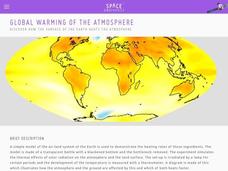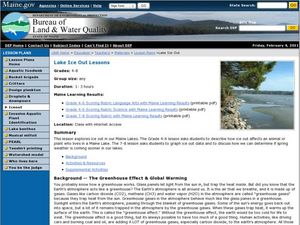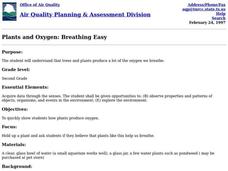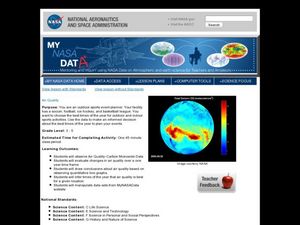Curated OER
Microbes
Microbiology beginners feed different sweetening agents to yeast and measure carbon dioxide production to estimate energy contained in each. They set the trials up in zip-top plastic baggies and then measure gas volume by water...
Curated OER
Science: The States of Matter
Third graders conduct experiments in matter to create chemical changes resulting in gases. By mixing solids and liquids, they create a chemical reaction and capture the gas in balloons. After observing the balloons fill with carbon...
Curated OER
Changing Planet: Sea Levels Rising
Begin by showing a six-minute video, Changing Planet: Rising Sea Level as an anticipatory set. Pupils draw a topographic map of a potato continent. Finally, they will visit NOAA's sea levels online map and NASA's carbon dioxide...
Center for Learning in Action
Introduction to Matter
Begin your states of matter lessons with a demonstration designed to introduce the concept that all matter has properties. Reinforce this concept through vocabulary exploration, and the creation of atom models; salt, water, and carbon...
Consortium for Ocean Science Exploration and Engagement (COSEE)
Climate Change Impacts on Blue King Crabs
Carbon dioxide is not only causing global temperatures to increase, it causes the oceans to become more acidic. Lesson focuses on the blue king crab and the fragility of the habitat due to climate change. Scholars create a concept map...
Space Awareness
Global Warming of the Atmosphere
Scientists know the amount of carbon dioxide in the atmosphere today is higher than at any point in the last 800,000 years. Scholars learn about the amount of thermic radiation absorbed by air and what happens to the rest of the...
Curated OER
Investigation of Crystallinity in Polymeric Materials
A kaleidoscope is constructed using polarizing polymer paper and then low-density polyethylene, high-density polyethylene, and polypropylene are all melted onto individual glass slides and examined through a microscope. The intent is to...
NOAA
Deep-Sea Ecosystems – Entering the Twilight Zone
Imagine an ecosystem without any light or oxygen, where living things convert carbon dioxide into food. This ecosystem is thriving and might just be the largest ecosystem on our planet, yet we know very little about it. The lesson...
Science Matters
Eruptions and Volcano Types
The Mammoth Lakes area regularly releases warnings to hikers and skiers to be careful because melting snow releases trapped gases from volcanic vents. The 17th lesson plan in the 20-part series opens with a demonstration of carbon...
Space Awareness
Oceans as a Heat Reservoir
Oceans absorb half of the carbon dioxide and 80 percent of the greenhouse gases released into the atmosphere. Scholars learn how and why the oceans store heat more effectively than land and how they help mitigate global warming. Pupils...
Science Matters
Photosynthesis-Cellular Respiration Cycle
The balance of nature can be a wondrous thing! With the 19th instructional activity of the 21-part series on systems, learners explore the cycle of photosynthesis and cellular respiration using a lab-based activity. Groups set up...
American Chemical Society
Climate Change and the Keeling Curve
Global warming has long been in the making. A thorough review of decades of research helps pupils discover the weather patterns of global warming. Learners then connect the weather changes to data in the Keeling Curve that reveals trends...
NASA
Producers Make Their Own Food
During an inquiry-based lesson plan, scholars decide which variable to test and then design an experiment to determine the needs of producers. After two weeks, they complete a full analysis and research paper.
Curated OER
Iron Fertilization - Pumping Iron
The theory that adding iron to ocean water may increase phytoplankton ability to remove carbon dioxide from the atmosphere is examined. The Monterey Bay Aquarium Research Institute is monitoring conditions off the California coast to...
Curated OER
The Science of Respiration and Blood Circulation
Fifth graders study how respiration and circulation are connected. In this respiratory lesson plan students complete several activities to better understand heart rate and carbon dioxide in the body.
Curated OER
How Can You Tell One Clear Gas From Another?
Fifth graders perform experiments to determine the identity of an unknown gas sample. In this chemistry lesson, 5th graders fill balloons with air, oxygen, hydrogen, and carbon dioxide. They use mass and reactivity to identify the gases.
Curated OER
Energy Awareness Quiz
High schoolers examine and become aware of critical energy issues. For this energy awareness lesson students complete an activity sheet and quiz.
Curated OER
Lake Ice Out Lessons
Students explore the greenhouse effect. For this environment lesson, students describe how "ice out" affects animals and plants who live in a Maine lake. Students graph "ice out" data and make predictions about the upcoming...
Curated OER
Visualizing the Greenhouse Effect and Global Warming
Students discover the differences between global warming and the greenhouse effect through hands-on classroom experiences. They use a 2-D globe and picture cards to identify the causes of both. Students visualize the human influence on...
Curated OER
Arbor Day
First graders study the importance of trees to our environment. they make their own version of the story by completing the following sentence and then completing an illustration for their writing. "A tree can be ______."
Curated OER
Tread Lightly: Low Carbon Lunch
Students create a flowchart of the carbon footprint of food from production to disposal. For this biology lesson, students brainstorm ways to reduce greenhouse gases by smart food choices. They create a blog promoting ways to eat low...
Curated OER
Activity #14 Floating Bubbles
Students comprehend that Carbon dioxide gas is relatively easy to generate. They comprehend that one way to produce it is with dry ice. Pupils comprehend that carbon dioxide gas can also be produced by combining baking soda with vinegar.
Curated OER
Air Quality
Students investigate what is known as the Greenhouse Effect. They begin to explore what some scientist think is the nature and fundamental causes of this problem. Students are able to give suggestions for alternative causes of global...
Other popular searches
- Carbon Dioxide Oxygen Cycle
- Carbon Dioxide Cycle
- Carbon Dioxide Balloon
- Co2 Cars
- Carbon Dioxide Levels
- Carbon Dioxide Emissions
- Experiments Carbon Dioxide
- Carbon Dioxide Detection
- Oxygen and Carbon Dioxide
- Trapping Carbon Dioxide
- Cows Carbon Dioxide
- Co2 Water Chemistry























